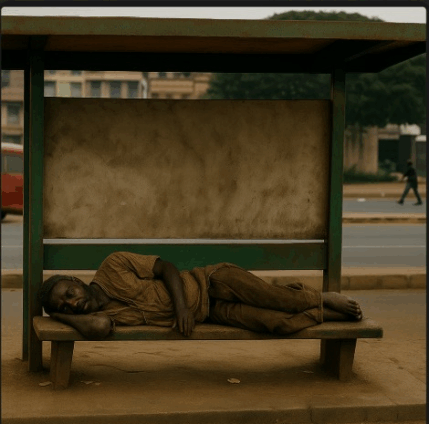Forgotten at the Bus Stop: Accra’s Quiet Crisis Each morning, as I make my way through the city, I am met with a sight that has quietly woven itse
Forgotten at the Bus Stop: Accra’s Quiet Crisis
Each morning, as I make my way through the city, I am met with a sight that has quietly woven itself into Accra’s daily rhythm — men and women, mentally unwell and homeless, sleeping on benches, pavements, or bare floors at our bus stops.
These are not fleeting scenes that vanish with the night. Even under the harsh daylight, some remain sprawled on benches, fast asleep, while others wander barefoot through the terminals — unseen, unbothered, and, perhaps most painfully, forgotten.
For many of us, the bus stop is merely a waiting point before another busy day. For them, it is the only place they can call home. What was once a space for commuters has become an open shelter for those battling mental illness. Yet we walk past them daily, as though they are invisible.
A Reflection of Neglect
We often dismiss it as a “madman problem.” But it is not madness — it is neglect. It is a symptom of how fragile and underfunded our social and mental health systems have become.
When there is no care, no shelter, and no family to turn to, the streets become the only refuge. The bus stop becomes the bed.
The Everyday Reality
Beyond sadness, there is fear and discomfort. Commuters whisper about safety. Some of these street dwellers rummage through bins or lash out unpredictably.
The benches are stained, the air is heavy, and yet no one pauses to ask why this continues.
What Needs to Change
The answer is not pity — and certainly not police crackdowns. What we need is compassion backed by action.
Mental health must be treated as a national priority, not a side issue. We need sustained outreach, rehabilitation centers, and safe shelters — places that offer treatment, dignity, and hope.
Metropolitan assemblies, NGOs, and community leaders must collaborate to build systems that don’t just clear the streets, but heal the people who live on them.
The Hard Truth
The sight of mentally unwell people sleeping at bus stops is more than an eyesore — it is a mirror reflecting how we treat the most vulnerable among us.
Until we fix the broken structures that abandon them, Accra’s bus stops will remain silent witnesses to human suffering in plain sight.
Each time I see someone curled up on a bench beneath the scorching sun, I’m reminded of how easily we’ve normalized what should never be normal. Deep down, we all know this is not right.
